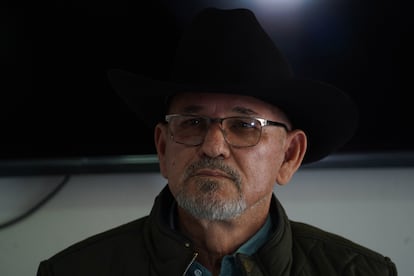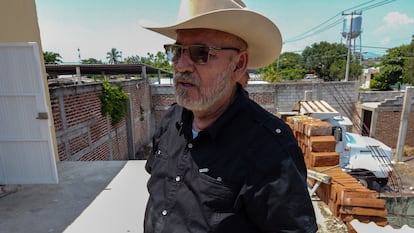Gunmen kill Hipólito Mora, founder of notorious Mexican self-defense militia
Attackers shot at and set fire to his vehicle as he was traveling through a small town in Michoacán


Hipólito Mora, the former leader and founder of a self-defense militia in the state of Michoacán (southwest Mexico), was killed on June 29 in La Ruana, a small town in the municipality of Buenavista (Michoacán). The farmer and community leader who organized local militias in 2013 to defend communities against the criminals that plagued the state, was shot and killed by heavily armed attackers. According to Guillermo Valencia, a former mayor of Tepalcatepec and Mora’s friend, he was traveling in a large armored vehicle with two bodyguards assigned by the Ministry of Public Safety, who also died in the attack.
The videos of the attack reveal the sharp sound of a high-caliber weapon being fired at the vehicle. “Then they set fire to the truck,” said Valencia. “This violent reality persists in Michoacán, while the authorities continue to deny the problem.” The region has long been plagued by the relentless turf war between the Jalisco New Generation Cartel and the United Cartels. Mora, a lemon farmer, had a price on his head and had been attacked several times before.
A La Ruana resident who wishes to remain anonymous, told EL PAÍS that they heard the first gunshots at 12 noon. “When the shooting started, I made sure my family was all safe and told them not to leave the house,” she said. The locals then began sharing videos of the attack showing criminals armed with long guns. “It looks like an AK-47 and some 9mm pistols,” she said. “But it had to be a bazooka [that set the vehicle on fire] or something similar, judging by how it sounded.”
After 15 minutes of gunfire, the town fell silent and people ventured out to the crime scene, where they saw two vehicles: the armored pickup truck Mora traveled in with two bodyguards, and an unarmored Ford pickup with two more guards. If verified, this would increase the death toll to five (four guards and Mora), more than Guillermo Valencia’s initial report of three casualties.
The National Guard and police units normally stationed in the town didn’t show up for two hours. A few locals put out the fire in the burning truck while other residents cautiously approached. People here say the authorities didn’t arrive until 2:20 pm, when a helicopter from the Attorney’s General’s office landed to inspect the crime scene. “The authorities vanished [when the shooting started], but everyone knows that the National Guard just patrols the area – they don’t actually do anything,” said the woman who talked to us.
Mora lived under constant threat by organized crime groups. His home was strafed by gunfire a few days before the attack that ended his life, and his longtime friend and bodyguard, Jorge Alberto Correa, was killed a year ago in Uruapan. Mora received threatening phone calls, text messages and even videos on social media every day.
Reactions to the death of this community leader who once dabbled in politics flooded in from all parts of Mexican society. Former President Felipe Calderón (2006-2012) tweeted: “With deep sadness, I heard about the cowardly murder of Hipólito Mora. My condolences to the family. I join in the demands for justice. May he rest in peace.” Former Michoacán Governor Silvano Aureoles said, “Hipólito Mora was shot and his body burned. The Tierra Caliente is a war zone because of the federal government’s erratic policies.”
Mora and other farmers in Michoacán took up arms against the Knights Templar, a peculiar criminal organization that professed to follow a quasi-religious creed while it produced methamphetamine and extorted farmers and merchants in Michoacán. The self-defense militias finally succeeded in driving out the Knights Templar, but the conflict was so bloody the federal government had to send a special envoy to negotiate peace.

With part of the problem solved, the federal government asked the local militias to join the rural police, hoping to maintain control over these fighters. Mora agreed, but soon ran into legal problems when he was arrested on suspicion of murdering two people close to another community leader nicknamed El Americano. He was also arrested for his involvement in a shootout. On both occasions, he was released without charges.
Sign up for our weekly newsletter to get more English-language news coverage from EL PAÍS USA Edition
Tu suscripción se está usando en otro dispositivo
¿Quieres añadir otro usuario a tu suscripción?
Si continúas leyendo en este dispositivo, no se podrá leer en el otro.
FlechaTu suscripción se está usando en otro dispositivo y solo puedes acceder a EL PAÍS desde un dispositivo a la vez.
Si quieres compartir tu cuenta, cambia tu suscripción a la modalidad Premium, así podrás añadir otro usuario. Cada uno accederá con su propia cuenta de email, lo que os permitirá personalizar vuestra experiencia en EL PAÍS.
¿Tienes una suscripción de empresa? Accede aquí para contratar más cuentas.
En el caso de no saber quién está usando tu cuenta, te recomendamos cambiar tu contraseña aquí.
Si decides continuar compartiendo tu cuenta, este mensaje se mostrará en tu dispositivo y en el de la otra persona que está usando tu cuenta de forma indefinida, afectando a tu experiencia de lectura. Puedes consultar aquí los términos y condiciones de la suscripción digital.








































